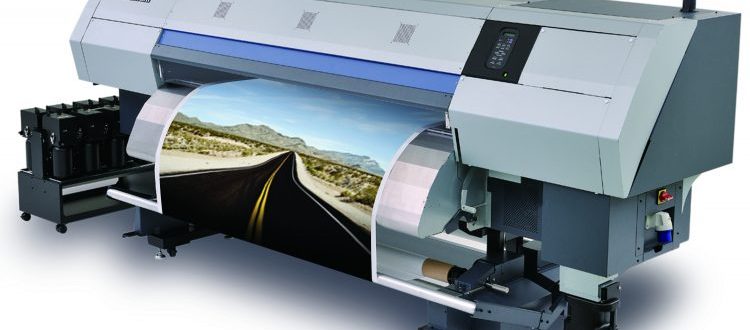While we don’t sell printing machines, nor do we ever plan to, we have purchased a few. This article is about dye sublimation inkjet printers and how they work and how they changed the banner and poster business in the past decade, and why I think they are the bomb!
The first sublimation printers used in the sign industry were not inkjets, but those that used a ribbon technology that was more akin to a thermal transfer 4-color process print cloth/fabric. They were and are great little print devices for short run decals and small signs, but with the advent of digital press, they really became too costly to be competitive, although I know a number of sign shops that still use them. Sometimes it’s just cheaper to keep the old machine running than go into debt for the latest technology. But sometimes it’s not.
How Dye Sublimation Inkjet Printers and Printing is Done and What Methods are Used
As I’ve written about a couple of times before, these were one of the most high end developments graphic industry in the last two decades. Fabric has always been the choice for classier events like trade shows where graphics are viewed up close, but the costs could be astronomical. In 2001 and 2002 we did a huge applique banner project for booster of a local state university at an astronomical price tag. We were happy for the work, but had it happened a couple years later, we would have used dye sub printer, and would have been able to do the project for about half the cost it did previously.
How and Why Inkjets are Simply Better
 When it comes to printing fabric, dye sublimation inkjet printers are unparalleled in efficiency, cost-savings, and in producing a beautiful finished product. There is no other one on the market that can do a one-off print of a photograph with stunning results at an affordable price. There are other methods, but these types only work with materials that have polymers in them. Not being a chemist, I don’t know exactly why this is, so maybe one of our readers who can explain polymers in layman’s terms would enlighten us. Other materials such as nylon do have polymers in them, while natural fibers like cotton do not. However, they typically work best on polyester fabrics.
When it comes to printing fabric, dye sublimation inkjet printers are unparalleled in efficiency, cost-savings, and in producing a beautiful finished product. There is no other one on the market that can do a one-off print of a photograph with stunning results at an affordable price. There are other methods, but these types only work with materials that have polymers in them. Not being a chemist, I don’t know exactly why this is, so maybe one of our readers who can explain polymers in layman’s terms would enlighten us. Other materials such as nylon do have polymers in them, while natural fibers like cotton do not. However, they typically work best on polyester fabrics.
One of the reasons they have become so popular is that the fabrics exhibit color in a continuous tone like a photograph, whereas inkjet printers on vinyl employ a dithering process which sprays the CYMK ink down in dots patterns that resemble a photograph. While the eye may not pick up any difference at a distance of five feet, when you put them side by side, the finished product just looks more real.
How Economical is the Print Method? I Don’t Have a Huge Corporate Advertising Budget.
Of course, while vinyl are cheaper than polyester cloth banners printed by inkjet printers, they are still vinyl banners…kind of like vinyl car seats versus leather car seats…they look cheap. They’re great for some things, like announcing a new tool or a new style of work boot or a sale on hamburgers at Burger King, but if you have an upscale product or service, consider that if your display looks cheap, potential clients may view your service or product the same way. They might just think your customer service won’t be very good just because your vinyl banner looks cheaply made; certainly, if the company skimps on graphics, it might just skimp on customer service as well. Even if it’s not true, perception becomes reality in the mind of the beholder.
We are finding that, particularly in trade shows and conventions, but also in retail, poly knit and poly stretch fabrics have become immensely popular for many of the reasons mentioned previously. In presenting your company to new eyes at a trade show or convention, your first impression may be your last, if you blow it. As with many types of advertising, you have less than 10 seconds to grab your potential client’s attention. Fabric banners work extremely well in this environment, and so do many of our clients.
Look here to get to know more about fabrics displays imprinted through dye sublimation inkjet printers.
Popular Posts:




